Impact of staff motivation schemes on employee retention: A case study on Next Plc.
VerifiedAdded on 2023/06/14
|12
|3106
|312
AI Summary
This research project aims to examine the effectiveness of staff motivation strategies on the retention of talent as a talent management strategy within Next Plc. The research objectives include identifying the conceptual framework of talent management and motivation within an organisation, determining the motivation strategies adopted by Next Plc. for the retention of talent, and discerning the challenges faced by managers of Next Plc. while adopting talent management strategies and motivating employees in the workplace.
Contribute Materials
Your contribution can guide someone’s learning journey. Share your
documents today.
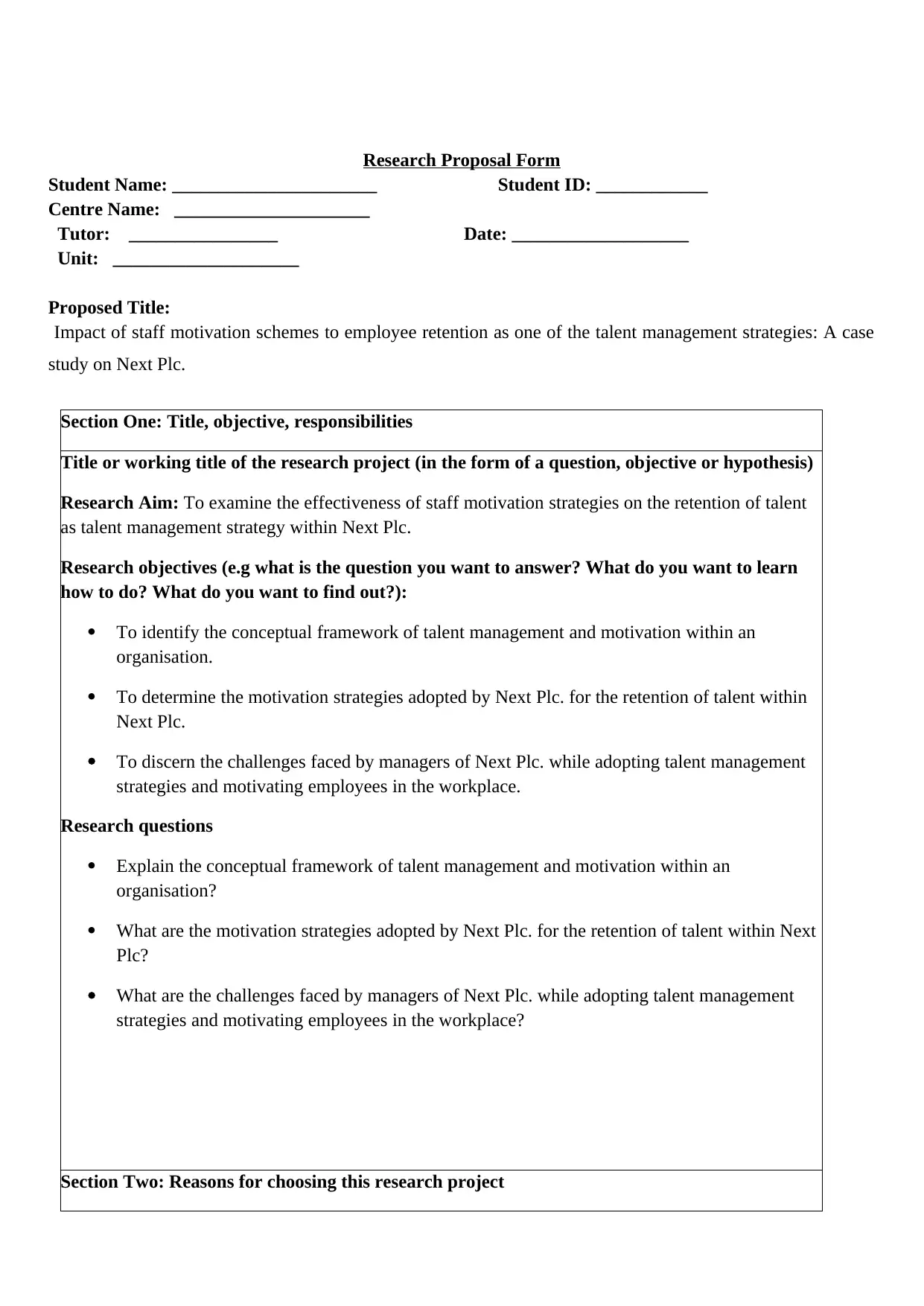
Research Proposal Form
Student Name: ______________________ Student ID: ____________
Centre Name: _____________________
Tutor: ________________ Date: ___________________
Unit: ____________________
Proposed Title:
Impact of staff motivation schemes to employee retention as one of the talent management strategies: A case
study on Next Plc.
Section One: Title, objective, responsibilities
Title or working title of the research project (in the form of a question, objective or hypothesis)
Research Aim: To examine the effectiveness of staff motivation strategies on the retention of talent
as talent management strategy within Next Plc.
Research objectives (e.g what is the question you want to answer? What do you want to learn
how to do? What do you want to find out?):
To identify the conceptual framework of talent management and motivation within an
organisation.
To determine the motivation strategies adopted by Next Plc. for the retention of talent within
Next Plc.
To discern the challenges faced by managers of Next Plc. while adopting talent management
strategies and motivating employees in the workplace.
Research questions
Explain the conceptual framework of talent management and motivation within an
organisation?
What are the motivation strategies adopted by Next Plc. for the retention of talent within Next
Plc?
What are the challenges faced by managers of Next Plc. while adopting talent management
strategies and motivating employees in the workplace?
Section Two: Reasons for choosing this research project
Student Name: ______________________ Student ID: ____________
Centre Name: _____________________
Tutor: ________________ Date: ___________________
Unit: ____________________
Proposed Title:
Impact of staff motivation schemes to employee retention as one of the talent management strategies: A case
study on Next Plc.
Section One: Title, objective, responsibilities
Title or working title of the research project (in the form of a question, objective or hypothesis)
Research Aim: To examine the effectiveness of staff motivation strategies on the retention of talent
as talent management strategy within Next Plc.
Research objectives (e.g what is the question you want to answer? What do you want to learn
how to do? What do you want to find out?):
To identify the conceptual framework of talent management and motivation within an
organisation.
To determine the motivation strategies adopted by Next Plc. for the retention of talent within
Next Plc.
To discern the challenges faced by managers of Next Plc. while adopting talent management
strategies and motivating employees in the workplace.
Research questions
Explain the conceptual framework of talent management and motivation within an
organisation?
What are the motivation strategies adopted by Next Plc. for the retention of talent within Next
Plc?
What are the challenges faced by managers of Next Plc. while adopting talent management
strategies and motivating employees in the workplace?
Section Two: Reasons for choosing this research project
Secure Best Marks with AI Grader
Need help grading? Try our AI Grader for instant feedback on your assignments.
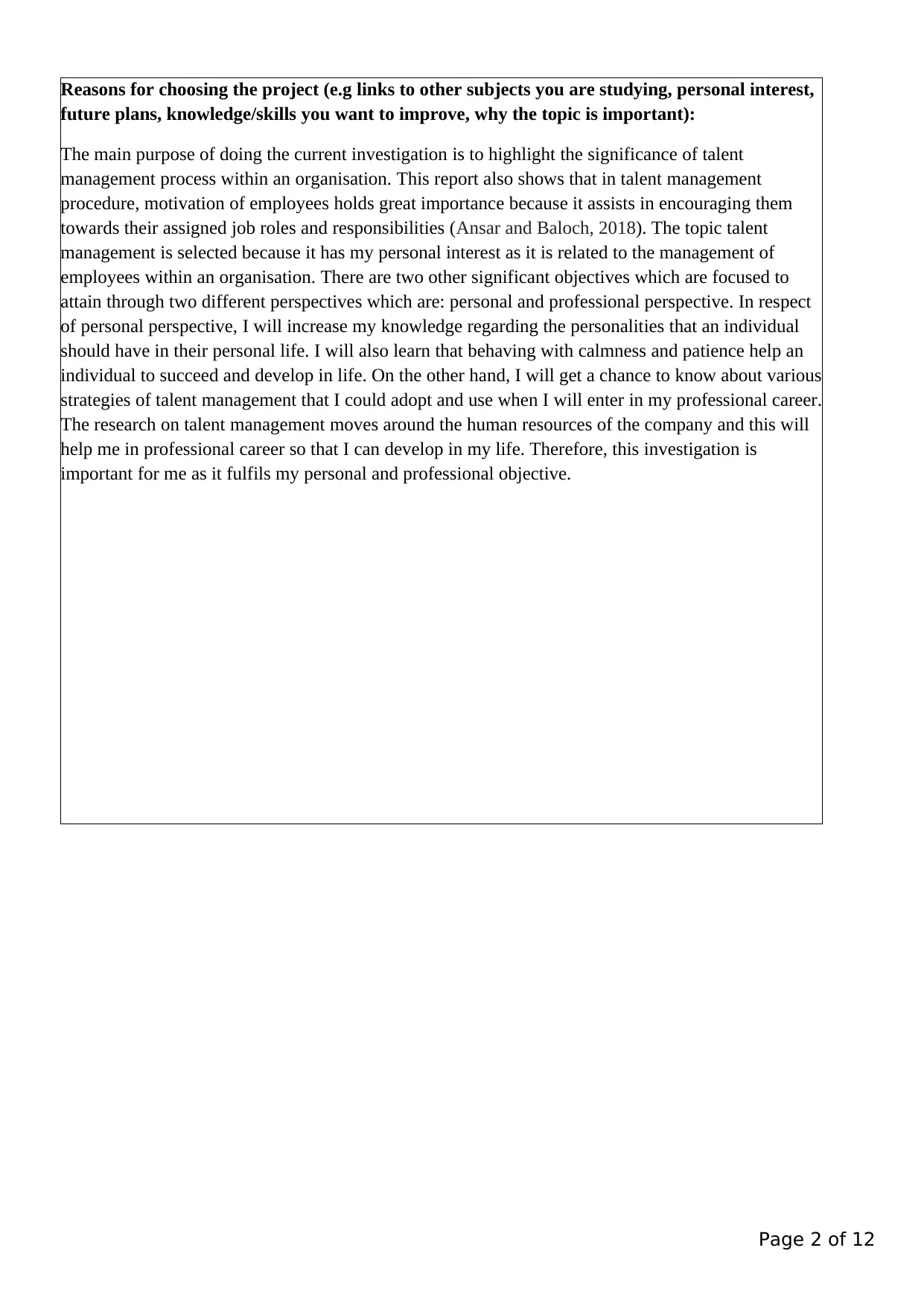
Reasons for choosing the project (e.g links to other subjects you are studying, personal interest,
future plans, knowledge/skills you want to improve, why the topic is important):
The main purpose of doing the current investigation is to highlight the significance of talent
management process within an organisation. This report also shows that in talent management
procedure, motivation of employees holds great importance because it assists in encouraging them
towards their assigned job roles and responsibilities (Ansar and Baloch, 2018). The topic talent
management is selected because it has my personal interest as it is related to the management of
employees within an organisation. There are two other significant objectives which are focused to
attain through two different perspectives which are: personal and professional perspective. In respect
of personal perspective, I will increase my knowledge regarding the personalities that an individual
should have in their personal life. I will also learn that behaving with calmness and patience help an
individual to succeed and develop in life. On the other hand, I will get a chance to know about various
strategies of talent management that I could adopt and use when I will enter in my professional career.
The research on talent management moves around the human resources of the company and this will
help me in professional career so that I can develop in my life. Therefore, this investigation is
important for me as it fulfils my personal and professional objective.
Page 2 of 12
future plans, knowledge/skills you want to improve, why the topic is important):
The main purpose of doing the current investigation is to highlight the significance of talent
management process within an organisation. This report also shows that in talent management
procedure, motivation of employees holds great importance because it assists in encouraging them
towards their assigned job roles and responsibilities (Ansar and Baloch, 2018). The topic talent
management is selected because it has my personal interest as it is related to the management of
employees within an organisation. There are two other significant objectives which are focused to
attain through two different perspectives which are: personal and professional perspective. In respect
of personal perspective, I will increase my knowledge regarding the personalities that an individual
should have in their personal life. I will also learn that behaving with calmness and patience help an
individual to succeed and develop in life. On the other hand, I will get a chance to know about various
strategies of talent management that I could adopt and use when I will enter in my professional career.
The research on talent management moves around the human resources of the company and this will
help me in professional career so that I can develop in my life. Therefore, this investigation is
important for me as it fulfils my personal and professional objective.
Page 2 of 12
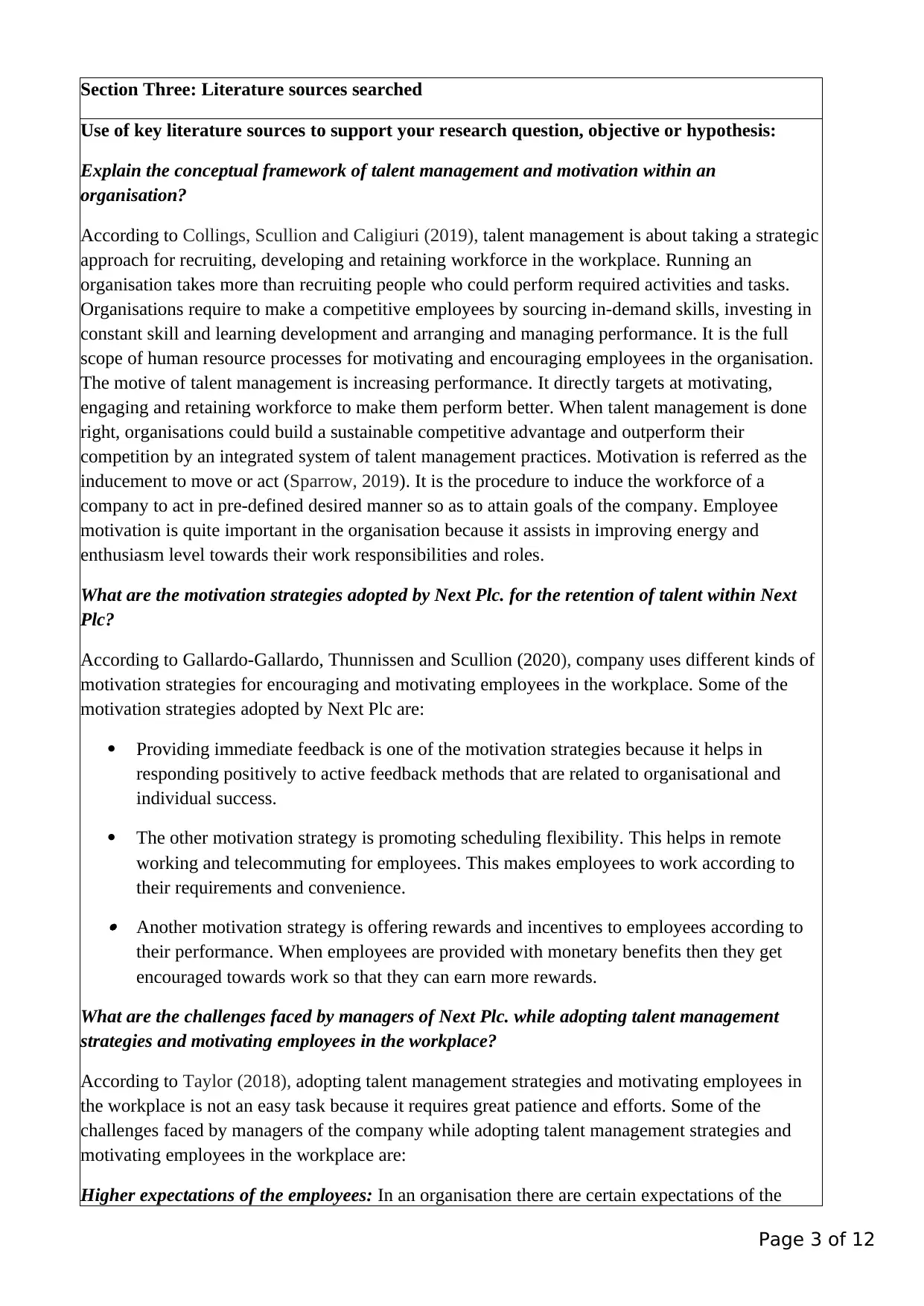
Section Three: Literature sources searched
Use of key literature sources to support your research question, objective or hypothesis:
Explain the conceptual framework of talent management and motivation within an
organisation?
According to Collings, Scullion and Caligiuri (2019), talent management is about taking a strategic
approach for recruiting, developing and retaining workforce in the workplace. Running an
organisation takes more than recruiting people who could perform required activities and tasks.
Organisations require to make a competitive employees by sourcing in-demand skills, investing in
constant skill and learning development and arranging and managing performance. It is the full
scope of human resource processes for motivating and encouraging employees in the organisation.
The motive of talent management is increasing performance. It directly targets at motivating,
engaging and retaining workforce to make them perform better. When talent management is done
right, organisations could build a sustainable competitive advantage and outperform their
competition by an integrated system of talent management practices. Motivation is referred as the
inducement to move or act (Sparrow, 2019). It is the procedure to induce the workforce of a
company to act in pre-defined desired manner so as to attain goals of the company. Employee
motivation is quite important in the organisation because it assists in improving energy and
enthusiasm level towards their work responsibilities and roles.
What are the motivation strategies adopted by Next Plc. for the retention of talent within Next
Plc?
According to Gallardo-Gallardo, Thunnissen and Scullion (2020), company uses different kinds of
motivation strategies for encouraging and motivating employees in the workplace. Some of the
motivation strategies adopted by Next Plc are:
Providing immediate feedback is one of the motivation strategies because it helps in
responding positively to active feedback methods that are related to organisational and
individual success.
The other motivation strategy is promoting scheduling flexibility. This helps in remote
working and telecommuting for employees. This makes employees to work according to
their requirements and convenience.
Another motivation strategy is offering rewards and incentives to employees according to
their performance. When employees are provided with monetary benefits then they get
encouraged towards work so that they can earn more rewards.
What are the challenges faced by managers of Next Plc. while adopting talent management
strategies and motivating employees in the workplace?
According to Taylor (2018), adopting talent management strategies and motivating employees in
the workplace is not an easy task because it requires great patience and efforts. Some of the
challenges faced by managers of the company while adopting talent management strategies and
motivating employees in the workplace are:
Higher expectations of the employees: In an organisation there are certain expectations of the
Page 3 of 12
Use of key literature sources to support your research question, objective or hypothesis:
Explain the conceptual framework of talent management and motivation within an
organisation?
According to Collings, Scullion and Caligiuri (2019), talent management is about taking a strategic
approach for recruiting, developing and retaining workforce in the workplace. Running an
organisation takes more than recruiting people who could perform required activities and tasks.
Organisations require to make a competitive employees by sourcing in-demand skills, investing in
constant skill and learning development and arranging and managing performance. It is the full
scope of human resource processes for motivating and encouraging employees in the organisation.
The motive of talent management is increasing performance. It directly targets at motivating,
engaging and retaining workforce to make them perform better. When talent management is done
right, organisations could build a sustainable competitive advantage and outperform their
competition by an integrated system of talent management practices. Motivation is referred as the
inducement to move or act (Sparrow, 2019). It is the procedure to induce the workforce of a
company to act in pre-defined desired manner so as to attain goals of the company. Employee
motivation is quite important in the organisation because it assists in improving energy and
enthusiasm level towards their work responsibilities and roles.
What are the motivation strategies adopted by Next Plc. for the retention of talent within Next
Plc?
According to Gallardo-Gallardo, Thunnissen and Scullion (2020), company uses different kinds of
motivation strategies for encouraging and motivating employees in the workplace. Some of the
motivation strategies adopted by Next Plc are:
Providing immediate feedback is one of the motivation strategies because it helps in
responding positively to active feedback methods that are related to organisational and
individual success.
The other motivation strategy is promoting scheduling flexibility. This helps in remote
working and telecommuting for employees. This makes employees to work according to
their requirements and convenience.
Another motivation strategy is offering rewards and incentives to employees according to
their performance. When employees are provided with monetary benefits then they get
encouraged towards work so that they can earn more rewards.
What are the challenges faced by managers of Next Plc. while adopting talent management
strategies and motivating employees in the workplace?
According to Taylor (2018), adopting talent management strategies and motivating employees in
the workplace is not an easy task because it requires great patience and efforts. Some of the
challenges faced by managers of the company while adopting talent management strategies and
motivating employees in the workplace are:
Higher expectations of the employees: In an organisation there are certain expectations of the
Page 3 of 12
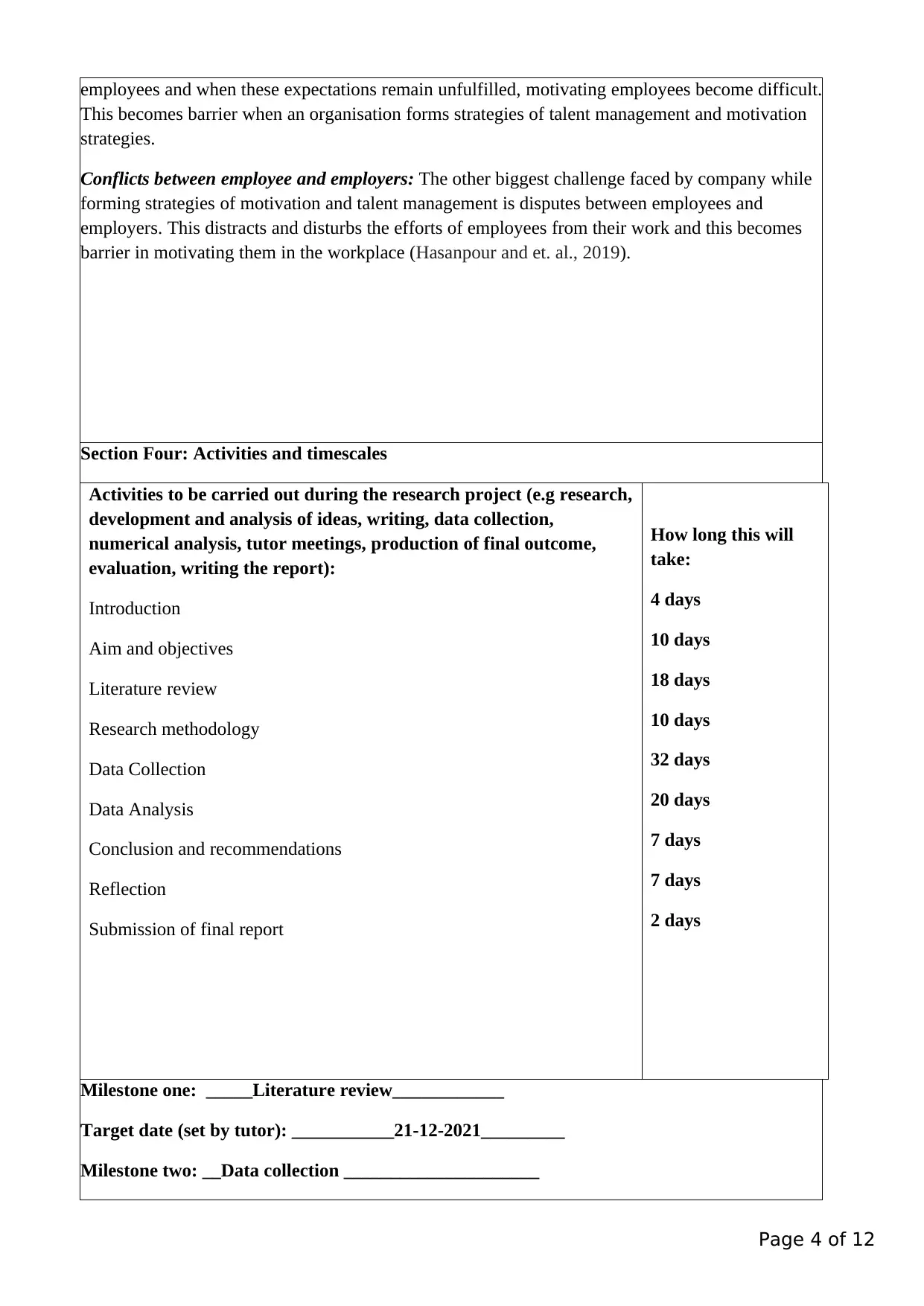
employees and when these expectations remain unfulfilled, motivating employees become difficult.
This becomes barrier when an organisation forms strategies of talent management and motivation
strategies.
Conflicts between employee and employers: The other biggest challenge faced by company while
forming strategies of motivation and talent management is disputes between employees and
employers. This distracts and disturbs the efforts of employees from their work and this becomes
barrier in motivating them in the workplace (Hasanpour and et. al., 2019).
Section Four: Activities and timescales
Activities to be carried out during the research project (e.g research,
development and analysis of ideas, writing, data collection,
numerical analysis, tutor meetings, production of final outcome,
evaluation, writing the report):
Introduction
Aim and objectives
Literature review
Research methodology
Data Collection
Data Analysis
Conclusion and recommendations
Reflection
Submission of final report
How long this will
take:
4 days
10 days
18 days
10 days
32 days
20 days
7 days
7 days
2 days
Milestone one: _____Literature review____________
Target date (set by tutor): ___________21-12-2021_________
Milestone two: __Data collection _____________________
Page 4 of 12
This becomes barrier when an organisation forms strategies of talent management and motivation
strategies.
Conflicts between employee and employers: The other biggest challenge faced by company while
forming strategies of motivation and talent management is disputes between employees and
employers. This distracts and disturbs the efforts of employees from their work and this becomes
barrier in motivating them in the workplace (Hasanpour and et. al., 2019).
Section Four: Activities and timescales
Activities to be carried out during the research project (e.g research,
development and analysis of ideas, writing, data collection,
numerical analysis, tutor meetings, production of final outcome,
evaluation, writing the report):
Introduction
Aim and objectives
Literature review
Research methodology
Data Collection
Data Analysis
Conclusion and recommendations
Reflection
Submission of final report
How long this will
take:
4 days
10 days
18 days
10 days
32 days
20 days
7 days
7 days
2 days
Milestone one: _____Literature review____________
Target date (set by tutor): ___________21-12-2021_________
Milestone two: __Data collection _____________________
Page 4 of 12
Secure Best Marks with AI Grader
Need help grading? Try our AI Grader for instant feedback on your assignments.
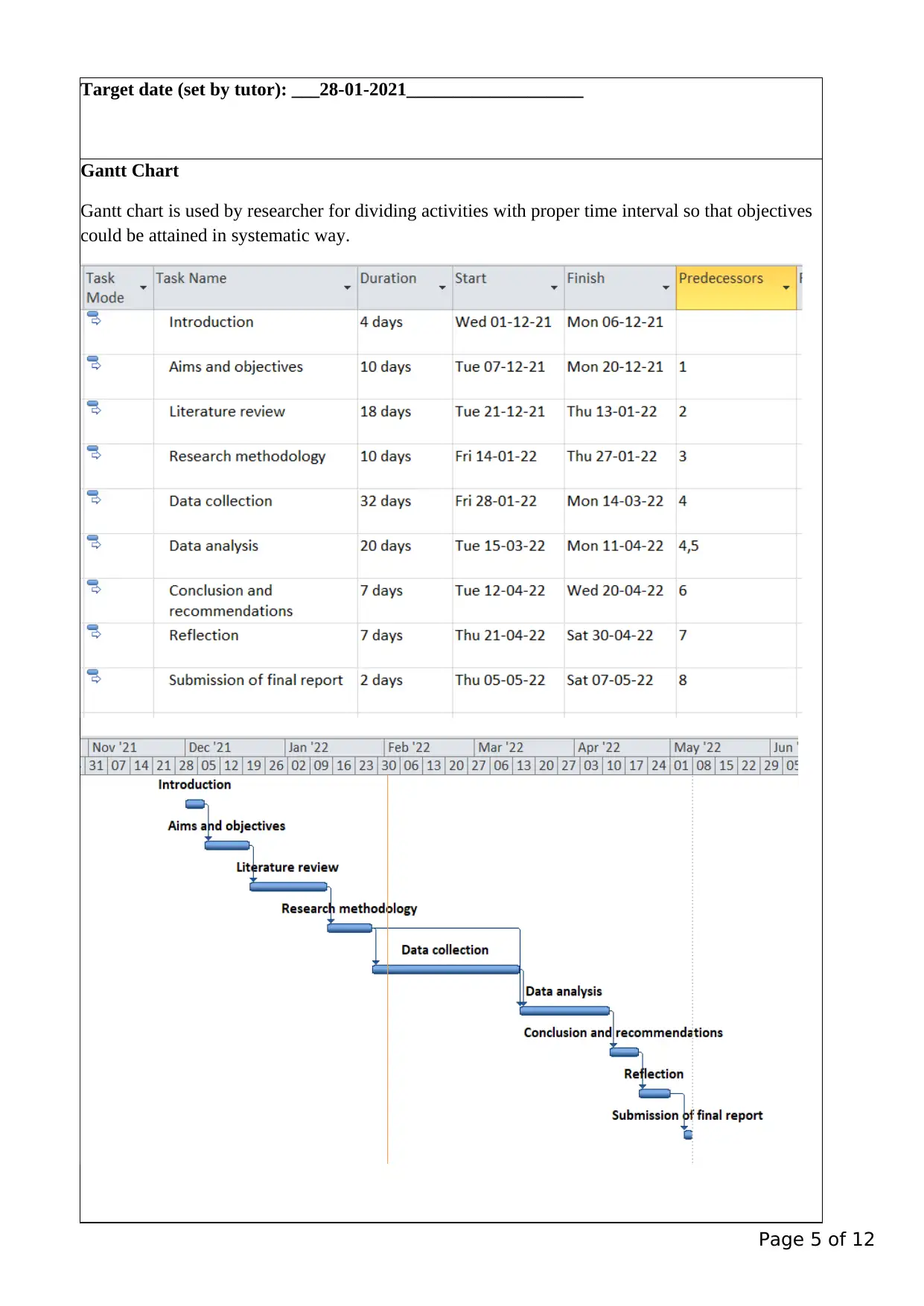
Target date (set by tutor): ___28-01-2021___________________
Gantt Chart
Gantt chart is used by researcher for dividing activities with proper time interval so that objectives
could be attained in systematic way.
Page 5 of 12
Gantt Chart
Gantt chart is used by researcher for dividing activities with proper time interval so that objectives
could be attained in systematic way.
Page 5 of 12
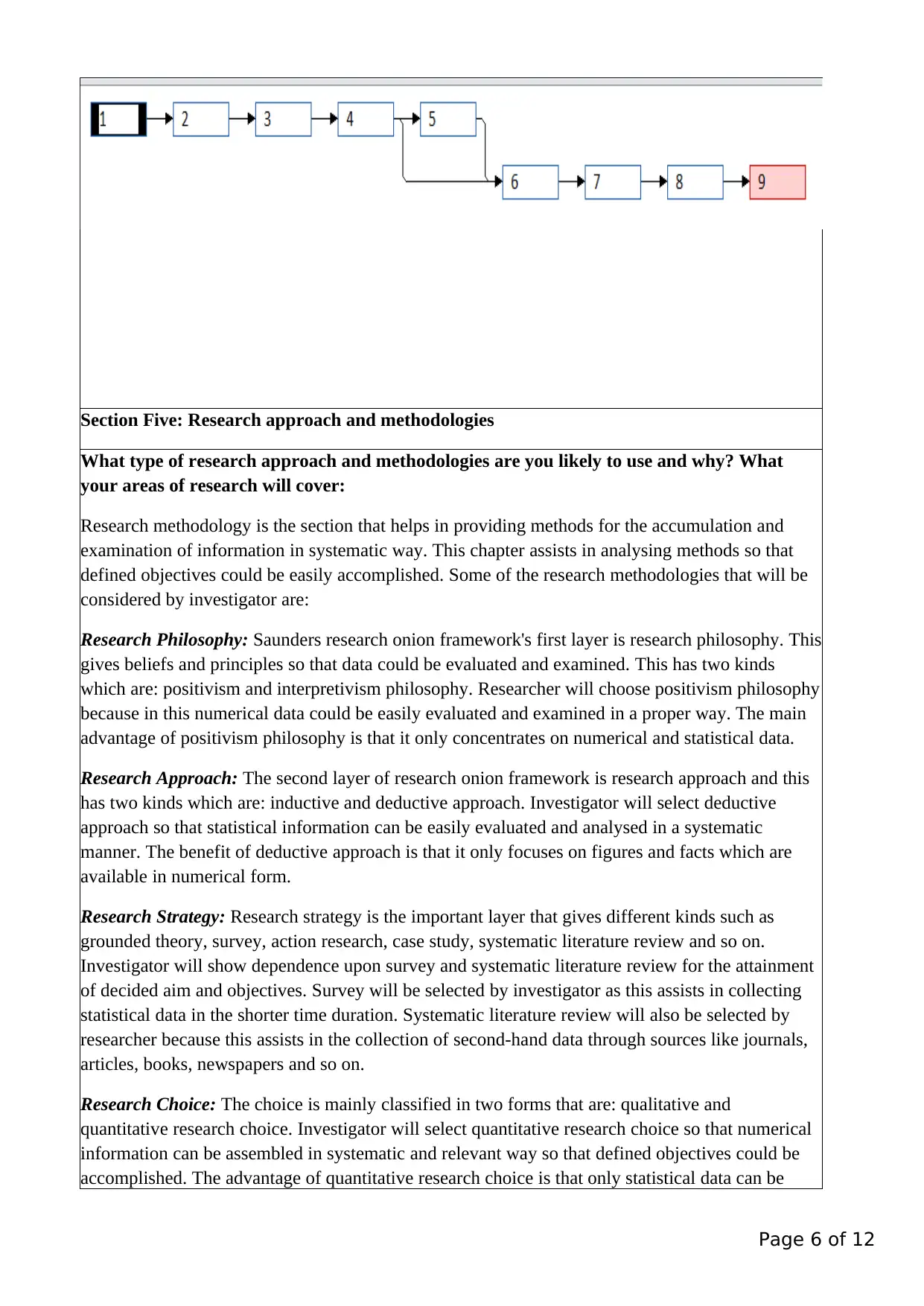
Section Five: Research approach and methodologies
What type of research approach and methodologies are you likely to use and why? What
your areas of research will cover:
Research methodology is the section that helps in providing methods for the accumulation and
examination of information in systematic way. This chapter assists in analysing methods so that
defined objectives could be easily accomplished. Some of the research methodologies that will be
considered by investigator are:
Research Philosophy: Saunders research onion framework's first layer is research philosophy. This
gives beliefs and principles so that data could be evaluated and examined. This has two kinds
which are: positivism and interpretivism philosophy. Researcher will choose positivism philosophy
because in this numerical data could be easily evaluated and examined in a proper way. The main
advantage of positivism philosophy is that it only concentrates on numerical and statistical data.
Research Approach: The second layer of research onion framework is research approach and this
has two kinds which are: inductive and deductive approach. Investigator will select deductive
approach so that statistical information can be easily evaluated and analysed in a systematic
manner. The benefit of deductive approach is that it only focuses on figures and facts which are
available in numerical form.
Research Strategy: Research strategy is the important layer that gives different kinds such as
grounded theory, survey, action research, case study, systematic literature review and so on.
Investigator will show dependence upon survey and systematic literature review for the attainment
of decided aim and objectives. Survey will be selected by investigator as this assists in collecting
statistical data in the shorter time duration. Systematic literature review will also be selected by
researcher because this assists in the collection of second-hand data through sources like journals,
articles, books, newspapers and so on.
Research Choice: The choice is mainly classified in two forms that are: qualitative and
quantitative research choice. Investigator will select quantitative research choice so that numerical
information can be assembled in systematic and relevant way so that defined objectives could be
accomplished. The advantage of quantitative research choice is that only statistical data can be
Page 6 of 12
What type of research approach and methodologies are you likely to use and why? What
your areas of research will cover:
Research methodology is the section that helps in providing methods for the accumulation and
examination of information in systematic way. This chapter assists in analysing methods so that
defined objectives could be easily accomplished. Some of the research methodologies that will be
considered by investigator are:
Research Philosophy: Saunders research onion framework's first layer is research philosophy. This
gives beliefs and principles so that data could be evaluated and examined. This has two kinds
which are: positivism and interpretivism philosophy. Researcher will choose positivism philosophy
because in this numerical data could be easily evaluated and examined in a proper way. The main
advantage of positivism philosophy is that it only concentrates on numerical and statistical data.
Research Approach: The second layer of research onion framework is research approach and this
has two kinds which are: inductive and deductive approach. Investigator will select deductive
approach so that statistical information can be easily evaluated and analysed in a systematic
manner. The benefit of deductive approach is that it only focuses on figures and facts which are
available in numerical form.
Research Strategy: Research strategy is the important layer that gives different kinds such as
grounded theory, survey, action research, case study, systematic literature review and so on.
Investigator will show dependence upon survey and systematic literature review for the attainment
of decided aim and objectives. Survey will be selected by investigator as this assists in collecting
statistical data in the shorter time duration. Systematic literature review will also be selected by
researcher because this assists in the collection of second-hand data through sources like journals,
articles, books, newspapers and so on.
Research Choice: The choice is mainly classified in two forms that are: qualitative and
quantitative research choice. Investigator will select quantitative research choice so that numerical
information can be assembled in systematic and relevant way so that defined objectives could be
accomplished. The advantage of quantitative research choice is that only statistical data can be
Page 6 of 12
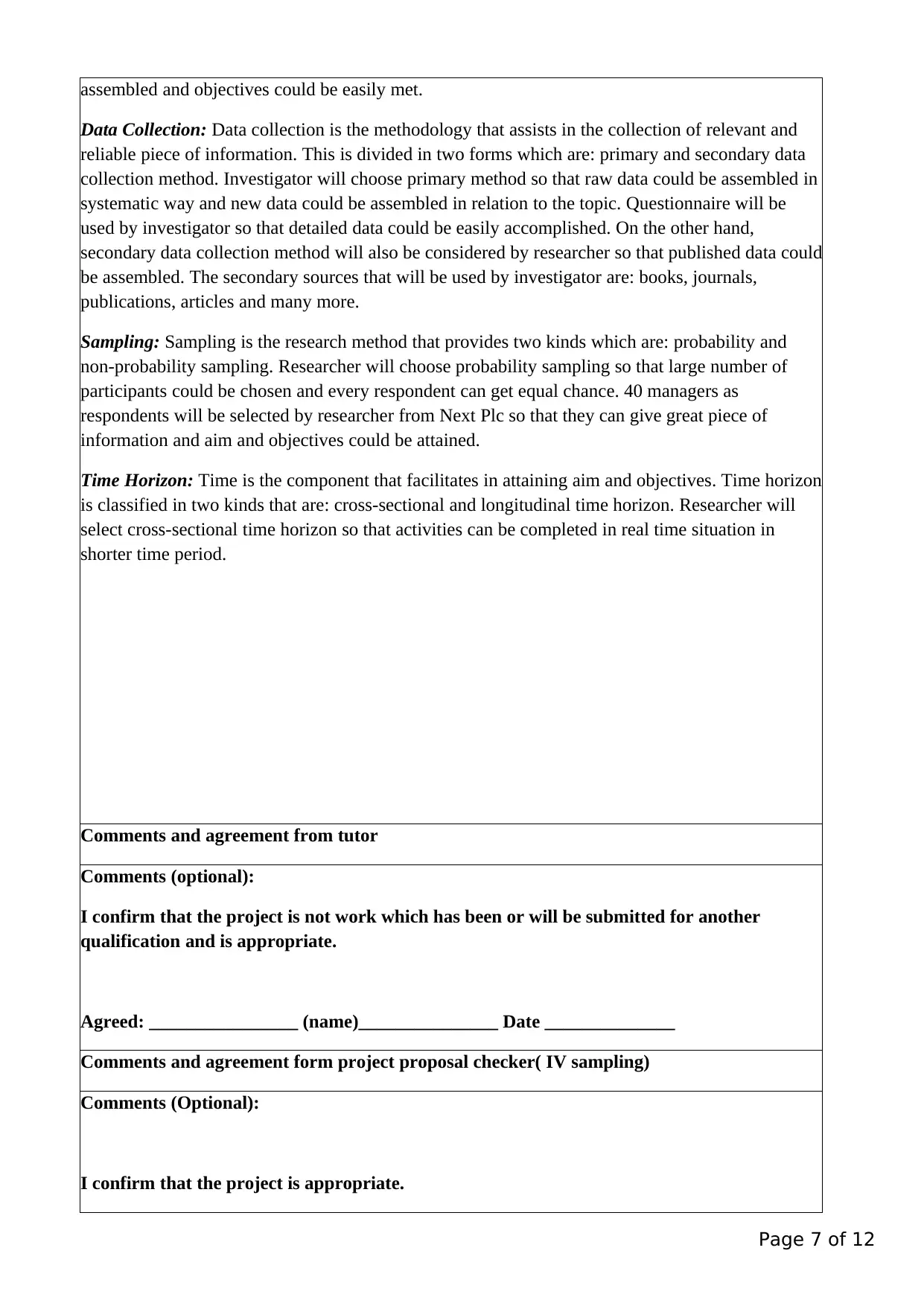
assembled and objectives could be easily met.
Data Collection: Data collection is the methodology that assists in the collection of relevant and
reliable piece of information. This is divided in two forms which are: primary and secondary data
collection method. Investigator will choose primary method so that raw data could be assembled in
systematic way and new data could be assembled in relation to the topic. Questionnaire will be
used by investigator so that detailed data could be easily accomplished. On the other hand,
secondary data collection method will also be considered by researcher so that published data could
be assembled. The secondary sources that will be used by investigator are: books, journals,
publications, articles and many more.
Sampling: Sampling is the research method that provides two kinds which are: probability and
non-probability sampling. Researcher will choose probability sampling so that large number of
participants could be chosen and every respondent can get equal chance. 40 managers as
respondents will be selected by researcher from Next Plc so that they can give great piece of
information and aim and objectives could be attained.
Time Horizon: Time is the component that facilitates in attaining aim and objectives. Time horizon
is classified in two kinds that are: cross-sectional and longitudinal time horizon. Researcher will
select cross-sectional time horizon so that activities can be completed in real time situation in
shorter time period.
Comments and agreement from tutor
Comments (optional):
I confirm that the project is not work which has been or will be submitted for another
qualification and is appropriate.
Agreed: ________________ (name)_______________ Date ______________
Comments and agreement form project proposal checker( IV sampling)
Comments (Optional):
I confirm that the project is appropriate.
Page 7 of 12
Data Collection: Data collection is the methodology that assists in the collection of relevant and
reliable piece of information. This is divided in two forms which are: primary and secondary data
collection method. Investigator will choose primary method so that raw data could be assembled in
systematic way and new data could be assembled in relation to the topic. Questionnaire will be
used by investigator so that detailed data could be easily accomplished. On the other hand,
secondary data collection method will also be considered by researcher so that published data could
be assembled. The secondary sources that will be used by investigator are: books, journals,
publications, articles and many more.
Sampling: Sampling is the research method that provides two kinds which are: probability and
non-probability sampling. Researcher will choose probability sampling so that large number of
participants could be chosen and every respondent can get equal chance. 40 managers as
respondents will be selected by researcher from Next Plc so that they can give great piece of
information and aim and objectives could be attained.
Time Horizon: Time is the component that facilitates in attaining aim and objectives. Time horizon
is classified in two kinds that are: cross-sectional and longitudinal time horizon. Researcher will
select cross-sectional time horizon so that activities can be completed in real time situation in
shorter time period.
Comments and agreement from tutor
Comments (optional):
I confirm that the project is not work which has been or will be submitted for another
qualification and is appropriate.
Agreed: ________________ (name)_______________ Date ______________
Comments and agreement form project proposal checker( IV sampling)
Comments (Optional):
I confirm that the project is appropriate.
Page 7 of 12
Paraphrase This Document
Need a fresh take? Get an instant paraphrase of this document with our AI Paraphraser
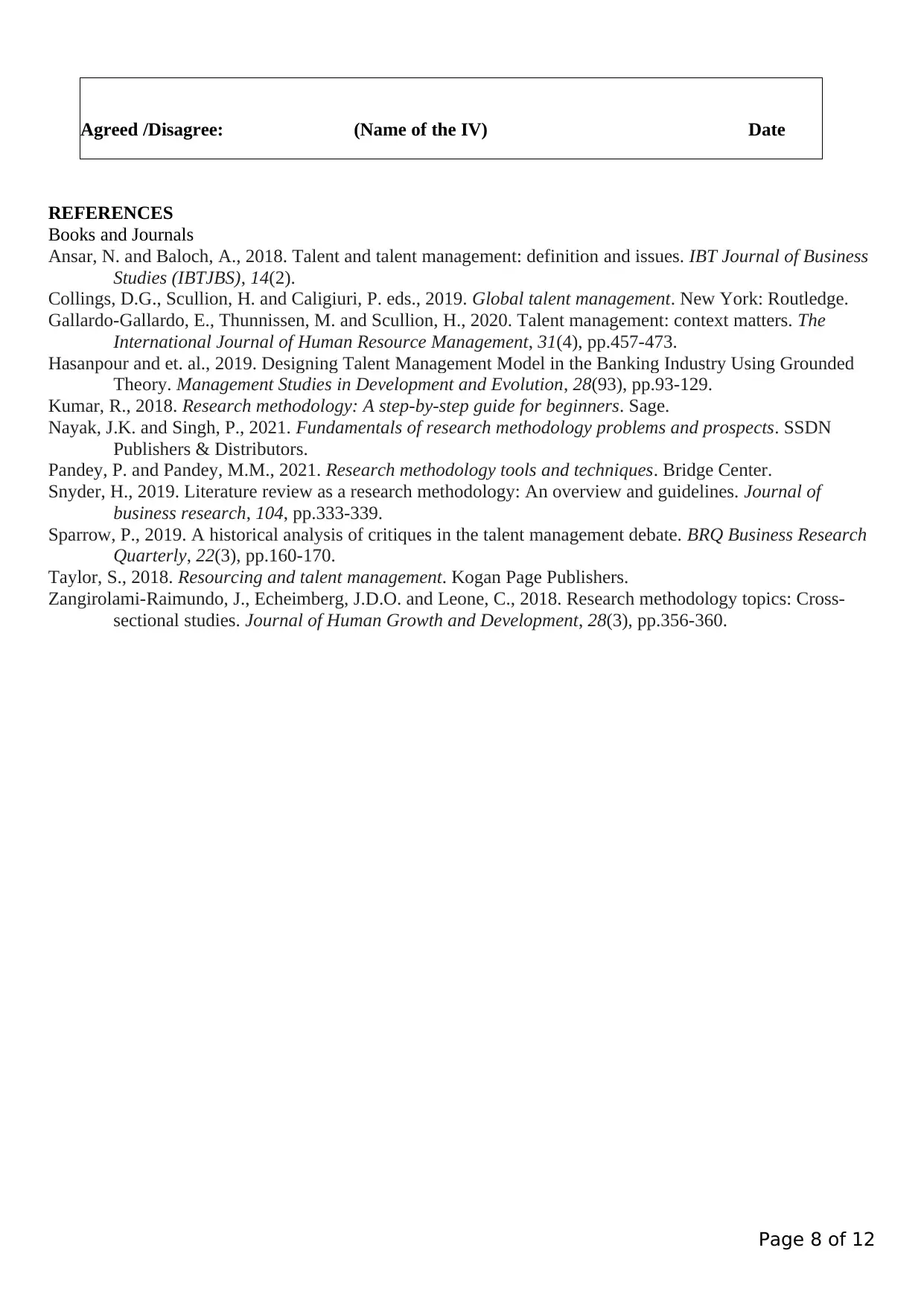
Agreed /Disagree: (Name of the IV) Date
REFERENCES
Books and Journals
Ansar, N. and Baloch, A., 2018. Talent and talent management: definition and issues. IBT Journal of Business
Studies (IBTJBS), 14(2).
Collings, D.G., Scullion, H. and Caligiuri, P. eds., 2019. Global talent management. New York: Routledge.
Gallardo-Gallardo, E., Thunnissen, M. and Scullion, H., 2020. Talent management: context matters. The
International Journal of Human Resource Management, 31(4), pp.457-473.
Hasanpour and et. al., 2019. Designing Talent Management Model in the Banking Industry Using Grounded
Theory. Management Studies in Development and Evolution, 28(93), pp.93-129.
Kumar, R., 2018. Research methodology: A step-by-step guide for beginners. Sage.
Nayak, J.K. and Singh, P., 2021. Fundamentals of research methodology problems and prospects. SSDN
Publishers & Distributors.
Pandey, P. and Pandey, M.M., 2021. Research methodology tools and techniques. Bridge Center.
Snyder, H., 2019. Literature review as a research methodology: An overview and guidelines. Journal of
business research, 104, pp.333-339.
Sparrow, P., 2019. A historical analysis of critiques in the talent management debate. BRQ Business Research
Quarterly, 22(3), pp.160-170.
Taylor, S., 2018. Resourcing and talent management. Kogan Page Publishers.
Zangirolami-Raimundo, J., Echeimberg, J.D.O. and Leone, C., 2018. Research methodology topics: Cross-
sectional studies. Journal of Human Growth and Development, 28(3), pp.356-360.
Page 8 of 12
REFERENCES
Books and Journals
Ansar, N. and Baloch, A., 2018. Talent and talent management: definition and issues. IBT Journal of Business
Studies (IBTJBS), 14(2).
Collings, D.G., Scullion, H. and Caligiuri, P. eds., 2019. Global talent management. New York: Routledge.
Gallardo-Gallardo, E., Thunnissen, M. and Scullion, H., 2020. Talent management: context matters. The
International Journal of Human Resource Management, 31(4), pp.457-473.
Hasanpour and et. al., 2019. Designing Talent Management Model in the Banking Industry Using Grounded
Theory. Management Studies in Development and Evolution, 28(93), pp.93-129.
Kumar, R., 2018. Research methodology: A step-by-step guide for beginners. Sage.
Nayak, J.K. and Singh, P., 2021. Fundamentals of research methodology problems and prospects. SSDN
Publishers & Distributors.
Pandey, P. and Pandey, M.M., 2021. Research methodology tools and techniques. Bridge Center.
Snyder, H., 2019. Literature review as a research methodology: An overview and guidelines. Journal of
business research, 104, pp.333-339.
Sparrow, P., 2019. A historical analysis of critiques in the talent management debate. BRQ Business Research
Quarterly, 22(3), pp.160-170.
Taylor, S., 2018. Resourcing and talent management. Kogan Page Publishers.
Zangirolami-Raimundo, J., Echeimberg, J.D.O. and Leone, C., 2018. Research methodology topics: Cross-
sectional studies. Journal of Human Growth and Development, 28(3), pp.356-360.
Page 8 of 12
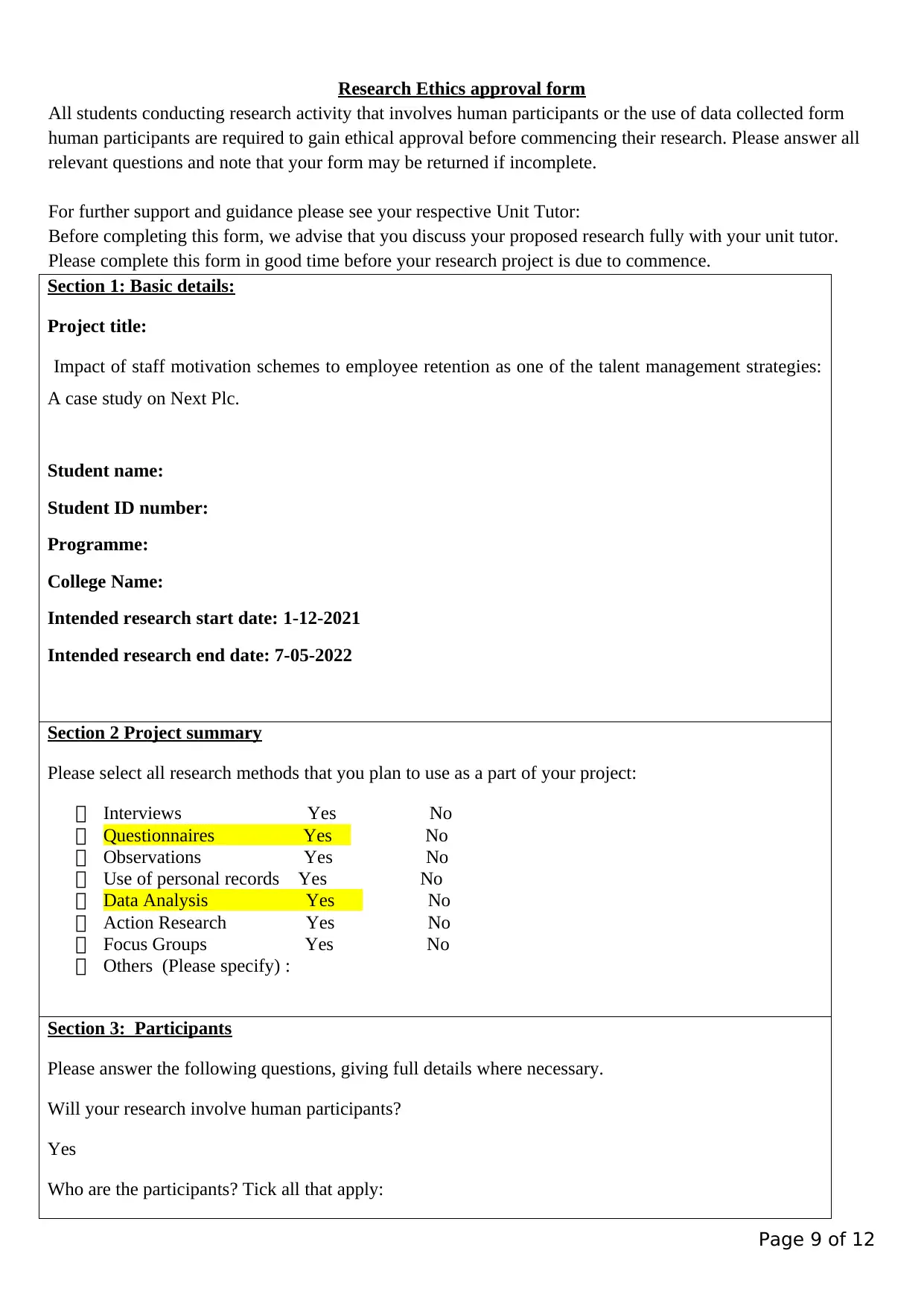
Research Ethics approval form
All students conducting research activity that involves human participants or the use of data collected form
human participants are required to gain ethical approval before commencing their research. Please answer all
relevant questions and note that your form may be returned if incomplete.
For further support and guidance please see your respective Unit Tutor:
Before completing this form, we advise that you discuss your proposed research fully with your unit tutor.
Please complete this form in good time before your research project is due to commence.
Section 1: Basic details:
Project title:
Impact of staff motivation schemes to employee retention as one of the talent management strategies:
A case study on Next Plc.
Student name:
Student ID number:
Programme:
College Name:
Intended research start date: 1-12-2021
Intended research end date: 7-05-2022
Section 2 Project summary
Please select all research methods that you plan to use as a part of your project:
Interviews Yes No
Questionnaires Yes No
Observations Yes No
Use of personal records Yes No
Data Analysis Yes No
Action Research Yes No
Focus Groups Yes No
Others (Please specify) :
Section 3: Participants
Please answer the following questions, giving full details where necessary.
Will your research involve human participants?
Yes
Who are the participants? Tick all that apply:
Page 9 of 12
All students conducting research activity that involves human participants or the use of data collected form
human participants are required to gain ethical approval before commencing their research. Please answer all
relevant questions and note that your form may be returned if incomplete.
For further support and guidance please see your respective Unit Tutor:
Before completing this form, we advise that you discuss your proposed research fully with your unit tutor.
Please complete this form in good time before your research project is due to commence.
Section 1: Basic details:
Project title:
Impact of staff motivation schemes to employee retention as one of the talent management strategies:
A case study on Next Plc.
Student name:
Student ID number:
Programme:
College Name:
Intended research start date: 1-12-2021
Intended research end date: 7-05-2022
Section 2 Project summary
Please select all research methods that you plan to use as a part of your project:
Interviews Yes No
Questionnaires Yes No
Observations Yes No
Use of personal records Yes No
Data Analysis Yes No
Action Research Yes No
Focus Groups Yes No
Others (Please specify) :
Section 3: Participants
Please answer the following questions, giving full details where necessary.
Will your research involve human participants?
Yes
Who are the participants? Tick all that apply:
Page 9 of 12
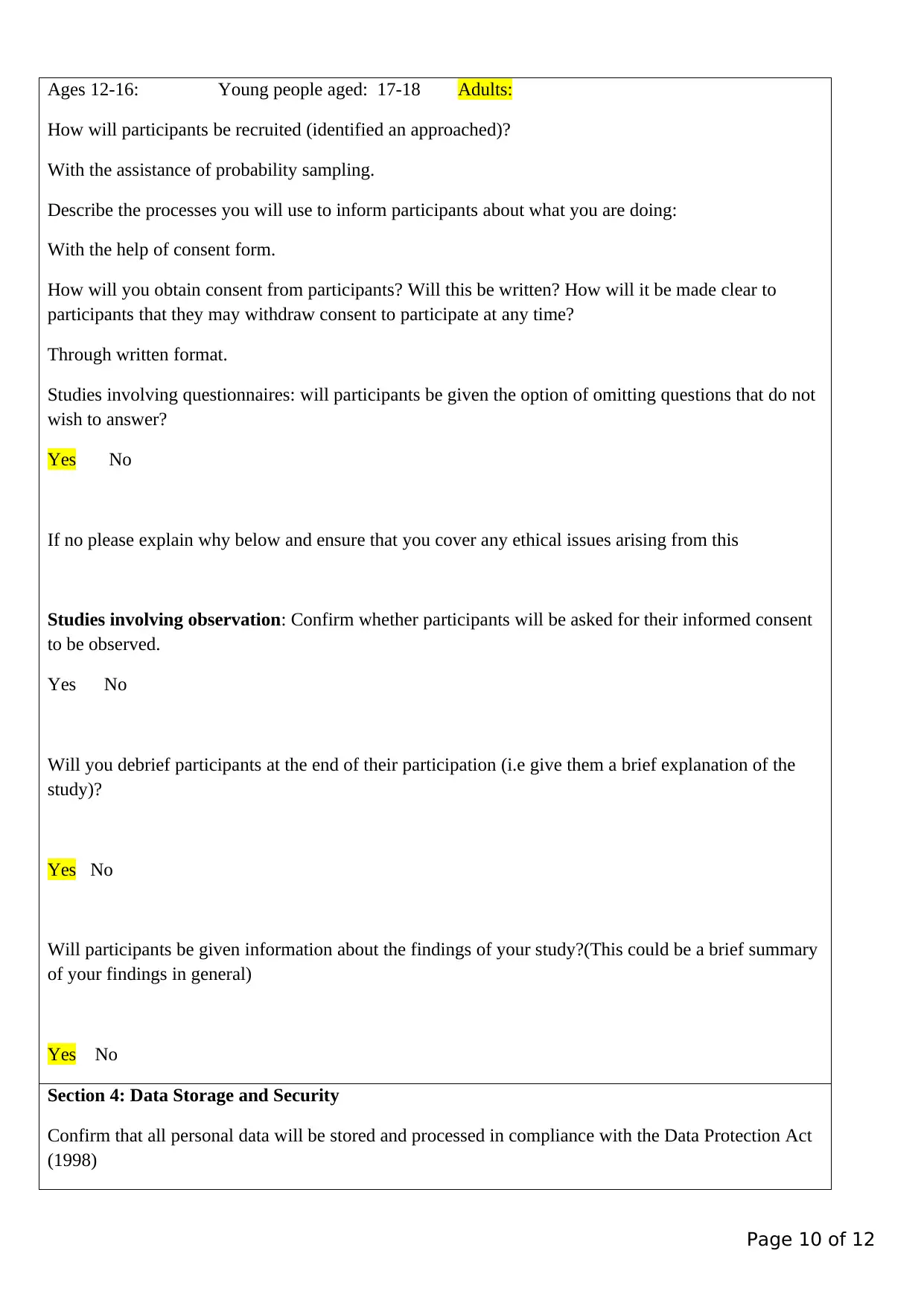
Ages 12-16: Young people aged: 17-18 Adults:
How will participants be recruited (identified an approached)?
With the assistance of probability sampling.
Describe the processes you will use to inform participants about what you are doing:
With the help of consent form.
How will you obtain consent from participants? Will this be written? How will it be made clear to
participants that they may withdraw consent to participate at any time?
Through written format.
Studies involving questionnaires: will participants be given the option of omitting questions that do not
wish to answer?
Yes No
If no please explain why below and ensure that you cover any ethical issues arising from this
Studies involving observation: Confirm whether participants will be asked for their informed consent
to be observed.
Yes No
Will you debrief participants at the end of their participation (i.e give them a brief explanation of the
study)?
Yes No
Will participants be given information about the findings of your study?(This could be a brief summary
of your findings in general)
Yes No
Section 4: Data Storage and Security
Confirm that all personal data will be stored and processed in compliance with the Data Protection Act
(1998)
Page 10 of 12
How will participants be recruited (identified an approached)?
With the assistance of probability sampling.
Describe the processes you will use to inform participants about what you are doing:
With the help of consent form.
How will you obtain consent from participants? Will this be written? How will it be made clear to
participants that they may withdraw consent to participate at any time?
Through written format.
Studies involving questionnaires: will participants be given the option of omitting questions that do not
wish to answer?
Yes No
If no please explain why below and ensure that you cover any ethical issues arising from this
Studies involving observation: Confirm whether participants will be asked for their informed consent
to be observed.
Yes No
Will you debrief participants at the end of their participation (i.e give them a brief explanation of the
study)?
Yes No
Will participants be given information about the findings of your study?(This could be a brief summary
of your findings in general)
Yes No
Section 4: Data Storage and Security
Confirm that all personal data will be stored and processed in compliance with the Data Protection Act
(1998)
Page 10 of 12
Secure Best Marks with AI Grader
Need help grading? Try our AI Grader for instant feedback on your assignments.
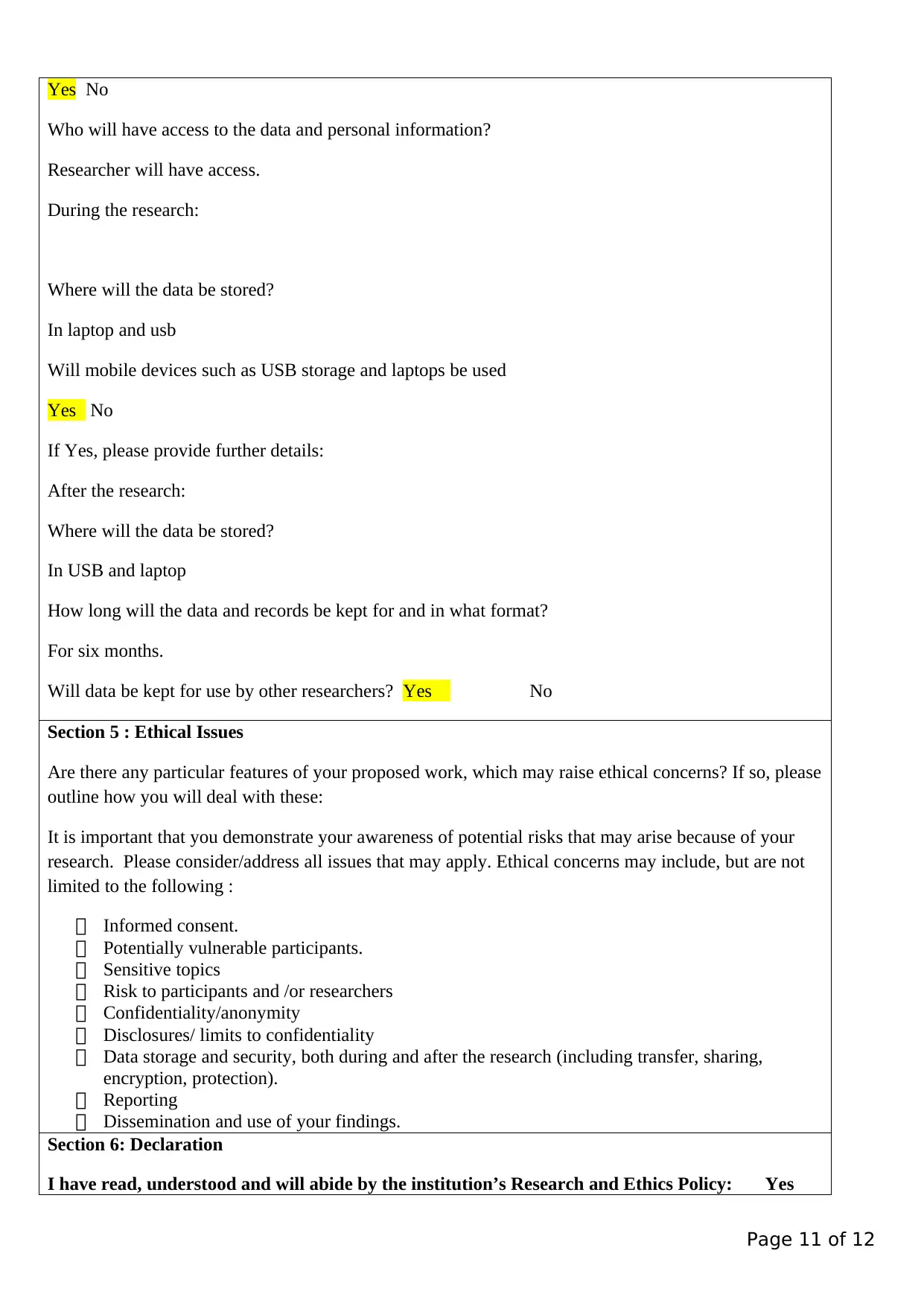
Yes No
Who will have access to the data and personal information?
Researcher will have access.
During the research:
Where will the data be stored?
In laptop and usb
Will mobile devices such as USB storage and laptops be used
Yes No
If Yes, please provide further details:
After the research:
Where will the data be stored?
In USB and laptop
How long will the data and records be kept for and in what format?
For six months.
Will data be kept for use by other researchers? Yes No
Section 5 : Ethical Issues
Are there any particular features of your proposed work, which may raise ethical concerns? If so, please
outline how you will deal with these:
It is important that you demonstrate your awareness of potential risks that may arise because of your
research. Please consider/address all issues that may apply. Ethical concerns may include, but are not
limited to the following :
Informed consent.
Potentially vulnerable participants.
Sensitive topics
Risk to participants and /or researchers
Confidentiality/anonymity
Disclosures/ limits to confidentiality
Data storage and security, both during and after the research (including transfer, sharing,
encryption, protection).
Reporting
Dissemination and use of your findings.
Section 6: Declaration
I have read, understood and will abide by the institution’s Research and Ethics Policy: Yes
Page 11 of 12
Who will have access to the data and personal information?
Researcher will have access.
During the research:
Where will the data be stored?
In laptop and usb
Will mobile devices such as USB storage and laptops be used
Yes No
If Yes, please provide further details:
After the research:
Where will the data be stored?
In USB and laptop
How long will the data and records be kept for and in what format?
For six months.
Will data be kept for use by other researchers? Yes No
Section 5 : Ethical Issues
Are there any particular features of your proposed work, which may raise ethical concerns? If so, please
outline how you will deal with these:
It is important that you demonstrate your awareness of potential risks that may arise because of your
research. Please consider/address all issues that may apply. Ethical concerns may include, but are not
limited to the following :
Informed consent.
Potentially vulnerable participants.
Sensitive topics
Risk to participants and /or researchers
Confidentiality/anonymity
Disclosures/ limits to confidentiality
Data storage and security, both during and after the research (including transfer, sharing,
encryption, protection).
Reporting
Dissemination and use of your findings.
Section 6: Declaration
I have read, understood and will abide by the institution’s Research and Ethics Policy: Yes
Page 11 of 12
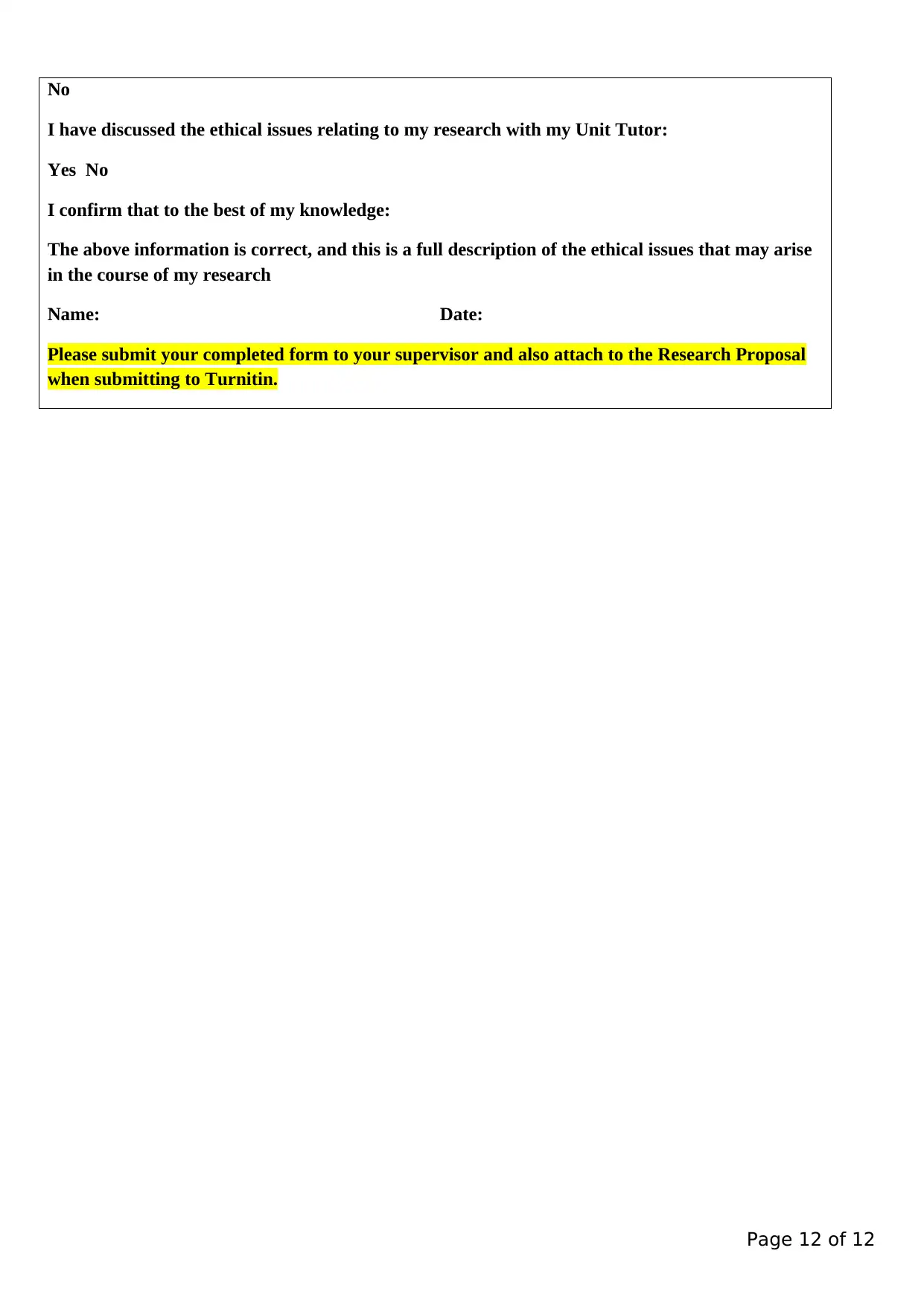
No
I have discussed the ethical issues relating to my research with my Unit Tutor:
Yes No
I confirm that to the best of my knowledge:
The above information is correct, and this is a full description of the ethical issues that may arise
in the course of my research
Name: Date:
Please submit your completed form to your supervisor and also attach to the Research Proposal
when submitting to Turnitin.
Page 12 of 12
I have discussed the ethical issues relating to my research with my Unit Tutor:
Yes No
I confirm that to the best of my knowledge:
The above information is correct, and this is a full description of the ethical issues that may arise
in the course of my research
Name: Date:
Please submit your completed form to your supervisor and also attach to the Research Proposal
when submitting to Turnitin.
Page 12 of 12
1 out of 12
Related Documents
Your All-in-One AI-Powered Toolkit for Academic Success.
+13062052269
info@desklib.com
Available 24*7 on WhatsApp / Email
![[object Object]](/_next/static/media/star-bottom.7253800d.svg)
Unlock your academic potential
© 2024 | Zucol Services PVT LTD | All rights reserved.

